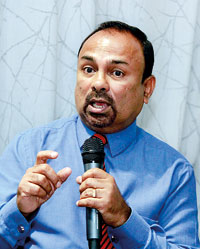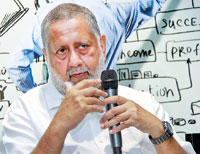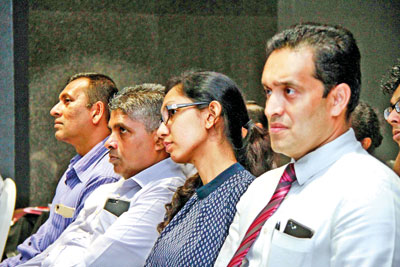Wide powers to Tax Chief in new tax laws effective today
The new Inland Revenue Act effective from today (April 1) gives wide and far reaching powers to the Commissioner General of the Inland Revenue Department (IRD) where, in one instance, he alone can decide whether a taxpayer can be accompanied by a lawyer or another representative to the IRD, or not.

Suresh Perera
Also under certain circumstances the Commissioner General has the power to decide taxes that one should pay in terms of future profits, said Principal -Tax and Regulatory, KPMG – Suresh Perera. He was speaking at a panel discussion titled ‘New regime in tax laws’ on the changes in taxation from April 1 organised by the Sunday Times Business Club at the Movenpick Hotel, Kollupitiya on Tuesday. Movenpick is the host hotel of the club while the NDB is a sponsor of the club.
Referring to real estate apartments, he said a final policy decision has not been taken so far on the enforcement of VAT.
However selling a house and land will not be taxed if one owned it for three years and lived there for more than two years. He said under the new Act one has to evaluate his future profits in paying taxes.

Roy Joseph
As far as the new Inland Revenue Act is concerned there will be no change for listed shares and will continue to be exempted from sales proceeds.However for unlisted shares there will be a change from April 1 if one sells it when it become taxable. Where listed debentures are concerned there will be a change in relation to its sales proceeds. Where foreign shares and foreign dividends are in the hands of Sri Lankans, they will not be liable for tax if one owns more than 10 per cent of the shareholding.
Where Treasury bills and bonds are concerned there is a 10 per cent withholding tax at present but after April 1 there won’t be any withholding tax. However interest on fixed deposits will be increased to 5 per cent. One salient feature of the new Island Revenue Act is that there won’t be any tax holidays or exemptions.
Meanwhile there will a change to employment income where the tax rate will go up to 24 per cent while the tax rate for professionals in practice will also go up to 24 per cent. He said although there are no tax holidays it does not mean that there are no incentives for investments especially by foreigners. Referring to migrants, he said if they acquire any foreign assets prior to migration they will be liable for taxation. “The best will be to migrate first and then to acquire foreign assets,” he added .

Rajendra Theagarajah. Pix by Indika Handuwala
Managing Director/ CEO Cargills Bank and the Chairman – Ceylon Chamber of Commerce Rajendra Theagarajah said from a national point of view the focus was to mobilise all sectors and not a few companies to build an export driven economy. It was defined that companies have to show that 80 per cent of its export revenue to qualify for concessions.
“The Ceylon Chamber of Commerce of Commerce has been lobbying from day one not to implement that proposal.” He said the total combined profits of all banks for last year was less than Rs. 100 billion and within the next 18 months every bank is expected to double the amount of capital as a buffer. Referring to inward remittances and the NRFC scheme, he said people are in a quandary at present whether to bring money to the country or keep it outside owing to the withholding tax on interest accruing all deposits including remittances.
Managing Director of Hemas Manufacturing (Pvt) Ltd, Roy Joseph said that his company was engaged in building brands overseas that brings foreign exchange to the country but under the new Act they will not be entitled for any tax concession. He said even domestically the tax rate is moving up where cash flows are impacted.
The three panellists spoke at length on the new tax laws, its impact on banking and the corporate community and on manufacturing and sales.

Section of the audience


